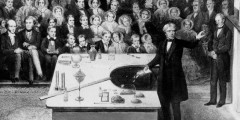What is a climate change communicator to do?
July 25, 2019
In a recent article, social scientists claim that a rhetoric of deadlines to urge action on climate change is ‘dangerous’. While I agree that it might be dangerous to get into a situation where you extend deadlines forever if you cannot achieve them, setting no deadlines at all may make it difficult to talk about …
Threads, worms and science communication
June 14, 2019
I thought I had written my last post about epigenetics. But then came along some ‘worms’ and I had to write another one. I have written about worms once before on the Making Science Public blog, in the context of science communication. And this blog post too will reflect on worms in the context of …
Public Understanding of Science – the 1960s
January 26, 2019
At the end of last year I wrote a blog post about a book in which Sheila Jasanoff asks ‘Can science makes sense of life’. She answers this question in a rather bleak and negative way. However, questions about the nature of science and the nature of life have stayed with me ever since, which …
Gene drive communication: Obstacles and opportunities
January 18, 2019
The other day I was talking to two people about various developments in science. Both are interested in science, but they are not natural scientists. I mentioned ‘gene drives’. Their faces went blank. I then said: “it’s something like the gene editing of a whole population of creatures, such as insects, for example. This can …
Science communication: Does social science help or hinder?
December 28, 2018
On 20th December Alice Bell tweeted a science communication story that made me laugh out loud! And then it made me think. Here is the story “Drunk suit fell over getting on the tube, exclaimed ‘Gravity! That’s physics! That’s the cleverest thing!’ and then started asking people in the carriage if they love physics and …
Triangulating the history of science communication: Faraday, Marcet and Smart
October 22, 2018
This post first appeared on the History and Philosophy of Language Sciences blog. I am reposting it on the Making Science Public blog with permission, where it can rub shoulders with other posts relating to science communication. ••• The 19th century was a time of monumental change in science, industry and also communication. In this …
How has Science Communication Research Developed? Results from a Citation Analysis
September 28, 2018
This is a guest post by Mike S. Schäfer (University of Zürich) & Adrian Rauchfleisch (National Taiwan University). The article summarised in this post first appeared in the Journal of Science Communication. This post contributes to the ‘science communication‘ strand of this blog. It can be read together with an older (2012) post which reports on how Rick Borchelt …
Science communication: What was it, what is it, and what should it be?
March 4, 2018
Science communication still puzzles people it seems, and that includes me. To get to the bottom of that puzzlement I looked at a blog post entitled “What’s this science communication and public engagement stuff all about?” This post provides a really useful overview of science communication and public engagement and people who want or have …
Historical fiction: A forgotten corner of science communication?
January 26, 2018
I recently read a wonderful tale about a 10th-century Arab philosopher, theologian and mathematician, Ibn al-Haytham (Alhazen). This wasn’t a biography (although I read that as well, afterwards); it was historical fiction – a historical novel. The tale was told by Bradley Steffens and entitled The Prisoner of Al-Hakim (2017). Immersed in the novel, I learned, …









